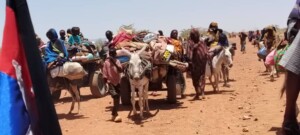Sudan to teach police, army, medics awareness of gender-based violence
Sudan is to establish a special unit to combat violence against women aimed to improve conditions for women, to protect them, and preserve their dignity. The transitional government is also drafting a new law to further criminalise gender-based violence.
 A displaced woman in Kalma camp, South Darfur (File photo: Albert González FarranUnamid)
A displaced woman in Kalma camp, South Darfur (File photo: Albert González FarranUnamid)
Sudan is to establish a special unit to combat violence against women aimed to improve conditions for women, to protect them, and preserve their dignity. The transitional government is also drafting a new law to further criminalise gender-based violence.
In an interview on the occasion of the International Day for the Elimination of Sexual Violence in Conflict on Friday, Sudan’s Minister of Labour and Social Development, Lina El Sheikh, said that material on the new law is to be included in teaching materials in the curricula of the military college, the police, the medical and health colleges, and legal studies. There will also be training courses for the various regular forces, in coordination with state agencies and civil society organisations, to protect the public from this type of violence in conflict zones.
El Sheikh said that a clearance of procedures document has been competed to address gender-based violence in Sudan, noting that her ministry launched a hotline service to receive reports of domestic violence in coordination with the Family and Child Protection Unit of the police and the specialised prosecution. She said that psychological, social, health, and legal support is provided in accordance with international standards.
She revealed the preparation of a national plan to implement Security Council Resolution 1325 on women, security, and peace, which was passed in the transitional cabinet last March during the celebration of the International Women’s Day.
El Sheikh said that Sudan has signed with the United Nations the resolution on women in the framework of joint cooperation with the aim of eliminating sexual violence related to the conflict in Sudan, supporting national policies, and strengthening health, justice and security services, which is a very important step for women in conflict zones in Sudan.
“Sexual violence has been used as a tool in the wars in Sudan, El Sheik said, and saluted Sudanese women, especially in conflict areas, and their struggle for rights and freedoms.
She pointed to victims of violence and victims of sexual violations that took place in the massacre of the break-up of the sit-in in Khartoum in June 2019.
On Friday, she explained to the official Sudan News Agency (SUNA) forum that Sudan has witnessed the longest wars in the African continent, with severe social and economic impacts on the war and conflict areas as well as orphans and victims of sexual violence.
The minister affirmed the commitment of the transitional government and her ministry to work to enhance opportunities for women to work and ensure their rights and protect them from all forms of exploitation and violence, especially sexual violence.
On the occasion of International Women’s Day on March 8, Prime Minister Abdallah Hamdok assured his government’s commitment “to end all aspects of institutional and social discrimination against women, in order to ensure their rights in all parts of the country.
“Achieving equality is one of the basic principles for making a successful and sustainable peaceful transition in Sudan,” he said. “The participation of women in all its institutions should be enhanced in a way that reflects their great role in the transition”.
Marking the sixth annual International Day for the Elimination of Sexual Violence in Conflict today, the UN Secretary-General António Guterres voiced solidarity with survivors, vowing to listen to them and act on their experiences and decisions.
Radio Dabanga’s editorial independence means that we can continue to provide factual updates about political developments to Sudanese and international actors, educate people about how to avoid outbreaks of infectious diseases, and provide a window to the world for those in all corners of Sudan. Support Radio Dabanga for as little as €2.50, the equivalent of a cup of coffee.












 and then
and then